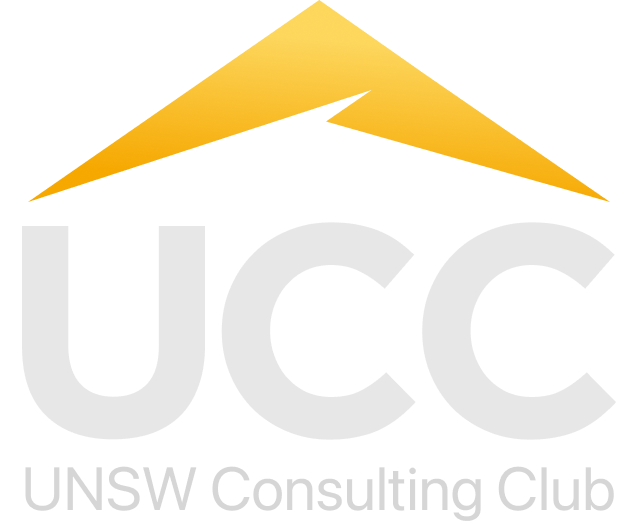From Lecture Halls to Client Calls
Edition #6: Wynona Tong
Welcome back to Coffee Connect! As the term ramps up and recruitment season winds down, many students are starting to reflect on what life looks like after university. What does that first job actually look like? How do you adjust from essays and exams to client meetings and workstreams?
To explore this transition, we spoke with Wynona Tong, a Business Analyst at Kearney, who recently made the jump herself. Graduating with a Bachelor of Commerce/Science from UNSW, Wynona came into Kearney with a breadth of experience within Marketing and HR Consulting, which she credits to her multidisciplinary studies and active university life. But what was it really like making the step from tutorials, internships, and societies into Kearney?
Consulting Beyond the Numbers
Great consultants aren't just analytical experts; they're excellent communicators and empathetic thinkers. Wynona notes that consultants often come from diverse academic backgrounds - everything from Commerce to Science to Engineering, and sometimes even Medicine.
Majoring in Psychology, Wynona found that understanding human motivation and behaviour added value to client work. Her science background gave her insight into how people think and learn, while her commerce degree offered a solid framework for solving business problems. Together, this shaped a human-centred lens on problem solving, particularly valuable in customer-facing projects, allowing her to empathise with the client.
As author Daniel H. Pink points out in his book Drive: The Suprising Truth About What Motivates Us, empathy is a crucial but often overlooked skill in professional contexts:
“Empathy is about standing in someone else’s shoes, feeling with his or her heart, seeing with his or her eyes.”
For students coming into consulting without “traditional business degrees”, Wynona’s advice is simple - lean into your strengths. What makes firms like Kearney so successful is their diversity of thought. Different perspectives help teams approach problems in richer, more creative ways - and your unique background is part of that value.
Building the Learning Curve
While many firms claim a collaborative environment, Wynona points to Kearney’s flat organisational structure as a real differentiator. Junior Business Analysts are encouraged to contribute from day one and often interact directly with senior leadership - making the culture feel transparent and inclusive.
Responsibility comes early, from owning workstreams to managing client interactions, new analysts are expected to step up - and are supported as they do so. “The level of trust I received early on was surprising,” Wynona reflects, “but it made me grow fast.”
That said, the shift from university to corporate isn’t just about adjusting your work style - it’s also about creating sustainable routines. The flexible nature of uni often means your time is your own. But full-time work requires intention.
Thriving with Habits that Stick
One of the most vital parts of entering the workforce is rebuilding structure. University is often the first time people fall out of routine, relying on last-minute sprints and inconsistent habits. But full-time work demands intention, energy management, and consistency.
For Wynona, that meant developing small, repeatable actions that fit around her schedule - like carving out time for a short daily run to decompress, or checking in regularly with her support network. Over time, these became anchors in her week, helping her maintain energy and avoid burnout.
At Coffee Connect, one approach some members of our team have found particularly useful for building a routine is habit stacking, which some people might be familiar with from the book Atomic Habits by James Clear. This technique works by attaching a new habit to an existing one - turning isolated behaviours into routines. For example, “after I close my laptop when working from home, I’ll go for a walk,” or “once I make my morning coffee, I’ll check my calendar and see what meeting I have.” Super simple, but helps build a routine which may have been lost during university and are looking to rebuild as you enter full-time work, and you can learn more about habit stacking here.
Habit stacking is a form of implementation intention - instead of pairing a desired habit with a particular time and location, you pair it with a current habit.
These stacked habits help transition from unstructured university life to the demands of full-time work by creating built-in cues for productive action, without needing to reinvent your entire lifestyle overnight. Small steps, repeated consistently, are what build a sustainable foundation.
Closing Comments
Ultimately, a career in consulting offers much more than strategic problem-solving. It’s an opportunity to learn deeply about yourself, to impact real-world outcomes, and to build lasting professional relationships.
Wynona’s story reflects a broader truth: the transition from studies to work isn’t about leaving one world behind - it’s about reframing what you already know and applying it in new ways. Your studies, your routines, your values - they come with you, and they evolve.
This article was written by Alan Steny, and edited by Rahul Pant. All experiences and opinions are their own unless otherwise specified, and do not represent the views of the UNSW Consulting Club or any affiliated organisations and sponsors.

